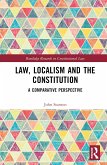Critically Examining the Case Against the 1998 Human Rights Act
Herausgeber: Cowell, Frederick
Critically Examining the Case Against the 1998 Human Rights Act
Herausgeber: Cowell, Frederick
- Gebundenes Buch
- Merkliste
- Auf die Merkliste
- Bewerten Bewerten
- Teilen
- Produkt teilen
- Produkterinnerung
- Produkterinnerung
Since its inception in 1998 the Human Rights Act has come in for a wide variety of criticism. More recently, this criticism escalated as politicians have seriously considered proposals for its abolition. This book examines the main arguments against the HRA and the issues which have led to public hostility against the protection of human rights.
Andere Kunden interessierten sich auch für
![The European Convention of Human Rights Regime The European Convention of Human Rights Regime]() Dia AnagnostouThe European Convention of Human Rights Regime153,99 €
Dia AnagnostouThe European Convention of Human Rights Regime153,99 €![Law and the Wearing of Religious Symbols in Europe Law and the Wearing of Religious Symbols in Europe]() Erica HowardLaw and the Wearing of Religious Symbols in Europe151,99 €
Erica HowardLaw and the Wearing of Religious Symbols in Europe151,99 €![Human Rights Defenders and the Law Human Rights Defenders and the Law]() Núria Saura-FreixesHuman Rights Defenders and the Law160,99 €
Núria Saura-FreixesHuman Rights Defenders and the Law160,99 €![Human Rights and Radical Social Transformation Human Rights and Radical Social Transformation]() Kathryn McNeillyHuman Rights and Radical Social Transformation171,99 €
Kathryn McNeillyHuman Rights and Radical Social Transformation171,99 €![Law, Localism, and the Constitution Law, Localism, and the Constitution]() John StantonLaw, Localism, and the Constitution160,99 €
John StantonLaw, Localism, and the Constitution160,99 €![Dignity, Degrading Treatment and Torture in Human Rights Law Dignity, Degrading Treatment and Torture in Human Rights Law]() Elaine WebsterDignity, Degrading Treatment and Torture in Human Rights Law181,99 €
Elaine WebsterDignity, Degrading Treatment and Torture in Human Rights Law181,99 €![Critical Indigenous Rights Studies Critical Indigenous Rights Studies]() Critical Indigenous Rights Studies187,99 €
Critical Indigenous Rights Studies187,99 €-
-
-
Since its inception in 1998 the Human Rights Act has come in for a wide variety of criticism. More recently, this criticism escalated as politicians have seriously considered proposals for its abolition. This book examines the main arguments against the HRA and the issues which have led to public hostility against the protection of human rights.
Produktdetails
- Produktdetails
- Verlag: Routledge
- Seitenzahl: 238
- Erscheinungstermin: 18. September 2017
- Englisch
- Abmessung: 240mm x 161mm x 17mm
- Gewicht: 526g
- ISBN-13: 9781138223820
- ISBN-10: 1138223824
- Artikelnr.: 49607221
- Herstellerkennzeichnung
- Libri GmbH
- Europaallee 1
- 36244 Bad Hersfeld
- gpsr@libri.de
- Verlag: Routledge
- Seitenzahl: 238
- Erscheinungstermin: 18. September 2017
- Englisch
- Abmessung: 240mm x 161mm x 17mm
- Gewicht: 526g
- ISBN-13: 9781138223820
- ISBN-10: 1138223824
- Artikelnr.: 49607221
- Herstellerkennzeichnung
- Libri GmbH
- Europaallee 1
- 36244 Bad Hersfeld
- gpsr@libri.de
Frederick Cowell is a Lecturer in Law at the School of Law, Birkbeck College, University of London
Introduction
1. Defining and understanding the case against the Human Rights Act
FREDERICK COWELL
PART I: The Historical Roots of the case against the Human Rights Act
2. The Magna Carta's Tainted Legacy: Historic Justifications for a
British Bill of Rights and the case against the Human Rights Act
COLIN MURRAY
3. England's terror of the French Revolution: the historical roots of
resistance to the rights of man and the case against the Human Rights
Act
BILL BOWRING
PART II: Sovereignty
4. An Ingenious Failure? The Human Rights Act and Parliamentary
Sovereignty
STEPHEN J. DIMELOW
5. Dialogue or Dictat?: The nature of the interaction between national
courts and the European Court of Human Rights and how it influences
criticism of the Human Rights Act
KANSTANTSIN DZEHTSIAROU
6. Taking Sovereignty Seriously
ADAM TUCKER
PART III: Controversial Claimants under the Human Rights Act
7. Terrorist threats, Anti-Terrorism and the case against the Human
Rights Act
CONOR GEARTY
8. Deportation and the Human Rights Act: Debunking the Myths
SIOBHAN LLOYD
9. Welfare, Anti-austerity and Gender: New territory and new sources of
hostility for the Human Rights Act
LAURA LAMMASNIEMI
PART IV: The structural basis of hostility to the Human Rights Act
10. Moving away from common sense: the impact of the juridification of
human rights
NICOLAS KANG-RIOU
11. 'Why should criminals have human rights?': The underserving rights
holder and the case against the Human Rights Act
FREDERICK COWELL
12. The failure of the Human Rights Act to construct a 'rights culture'
in the UK
TRUDY MORGAN
1. Defining and understanding the case against the Human Rights Act
FREDERICK COWELL
PART I: The Historical Roots of the case against the Human Rights Act
2. The Magna Carta's Tainted Legacy: Historic Justifications for a
British Bill of Rights and the case against the Human Rights Act
COLIN MURRAY
3. England's terror of the French Revolution: the historical roots of
resistance to the rights of man and the case against the Human Rights
Act
BILL BOWRING
PART II: Sovereignty
4. An Ingenious Failure? The Human Rights Act and Parliamentary
Sovereignty
STEPHEN J. DIMELOW
5. Dialogue or Dictat?: The nature of the interaction between national
courts and the European Court of Human Rights and how it influences
criticism of the Human Rights Act
KANSTANTSIN DZEHTSIAROU
6. Taking Sovereignty Seriously
ADAM TUCKER
PART III: Controversial Claimants under the Human Rights Act
7. Terrorist threats, Anti-Terrorism and the case against the Human
Rights Act
CONOR GEARTY
8. Deportation and the Human Rights Act: Debunking the Myths
SIOBHAN LLOYD
9. Welfare, Anti-austerity and Gender: New territory and new sources of
hostility for the Human Rights Act
LAURA LAMMASNIEMI
PART IV: The structural basis of hostility to the Human Rights Act
10. Moving away from common sense: the impact of the juridification of
human rights
NICOLAS KANG-RIOU
11. 'Why should criminals have human rights?': The underserving rights
holder and the case against the Human Rights Act
FREDERICK COWELL
12. The failure of the Human Rights Act to construct a 'rights culture'
in the UK
TRUDY MORGAN
Introduction
1. Defining and understanding the case against the Human Rights Act
FREDERICK COWELL
PART I: The Historical Roots of the case against the Human Rights Act
2. The Magna Carta's Tainted Legacy: Historic Justifications for a
British Bill of Rights and the case against the Human Rights Act
COLIN MURRAY
3. England's terror of the French Revolution: the historical roots of
resistance to the rights of man and the case against the Human Rights
Act
BILL BOWRING
PART II: Sovereignty
4. An Ingenious Failure? The Human Rights Act and Parliamentary
Sovereignty
STEPHEN J. DIMELOW
5. Dialogue or Dictat?: The nature of the interaction between national
courts and the European Court of Human Rights and how it influences
criticism of the Human Rights Act
KANSTANTSIN DZEHTSIAROU
6. Taking Sovereignty Seriously
ADAM TUCKER
PART III: Controversial Claimants under the Human Rights Act
7. Terrorist threats, Anti-Terrorism and the case against the Human
Rights Act
CONOR GEARTY
8. Deportation and the Human Rights Act: Debunking the Myths
SIOBHAN LLOYD
9. Welfare, Anti-austerity and Gender: New territory and new sources of
hostility for the Human Rights Act
LAURA LAMMASNIEMI
PART IV: The structural basis of hostility to the Human Rights Act
10. Moving away from common sense: the impact of the juridification of
human rights
NICOLAS KANG-RIOU
11. 'Why should criminals have human rights?': The underserving rights
holder and the case against the Human Rights Act
FREDERICK COWELL
12. The failure of the Human Rights Act to construct a 'rights culture'
in the UK
TRUDY MORGAN
1. Defining and understanding the case against the Human Rights Act
FREDERICK COWELL
PART I: The Historical Roots of the case against the Human Rights Act
2. The Magna Carta's Tainted Legacy: Historic Justifications for a
British Bill of Rights and the case against the Human Rights Act
COLIN MURRAY
3. England's terror of the French Revolution: the historical roots of
resistance to the rights of man and the case against the Human Rights
Act
BILL BOWRING
PART II: Sovereignty
4. An Ingenious Failure? The Human Rights Act and Parliamentary
Sovereignty
STEPHEN J. DIMELOW
5. Dialogue or Dictat?: The nature of the interaction between national
courts and the European Court of Human Rights and how it influences
criticism of the Human Rights Act
KANSTANTSIN DZEHTSIAROU
6. Taking Sovereignty Seriously
ADAM TUCKER
PART III: Controversial Claimants under the Human Rights Act
7. Terrorist threats, Anti-Terrorism and the case against the Human
Rights Act
CONOR GEARTY
8. Deportation and the Human Rights Act: Debunking the Myths
SIOBHAN LLOYD
9. Welfare, Anti-austerity and Gender: New territory and new sources of
hostility for the Human Rights Act
LAURA LAMMASNIEMI
PART IV: The structural basis of hostility to the Human Rights Act
10. Moving away from common sense: the impact of the juridification of
human rights
NICOLAS KANG-RIOU
11. 'Why should criminals have human rights?': The underserving rights
holder and the case against the Human Rights Act
FREDERICK COWELL
12. The failure of the Human Rights Act to construct a 'rights culture'
in the UK
TRUDY MORGAN









